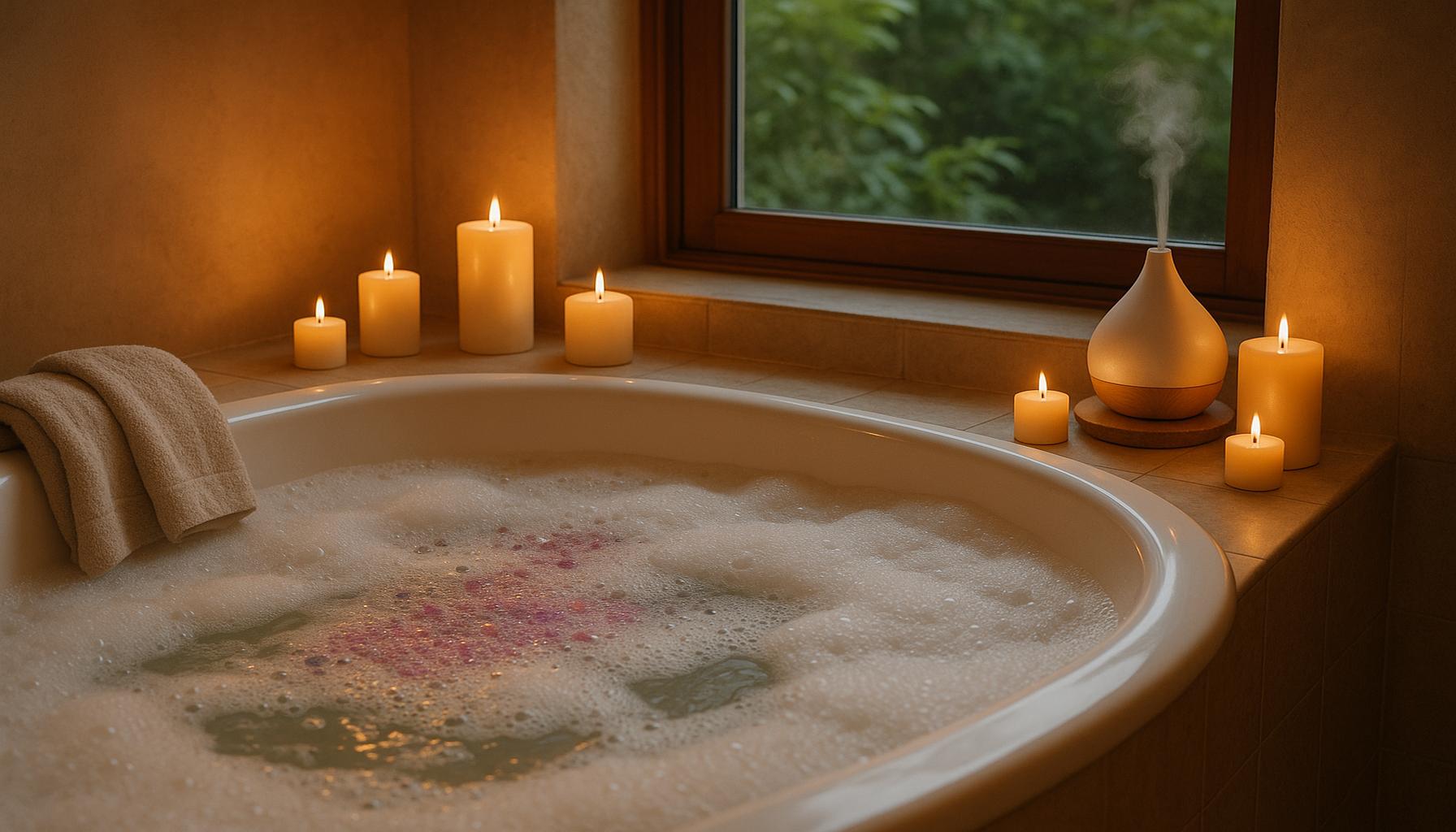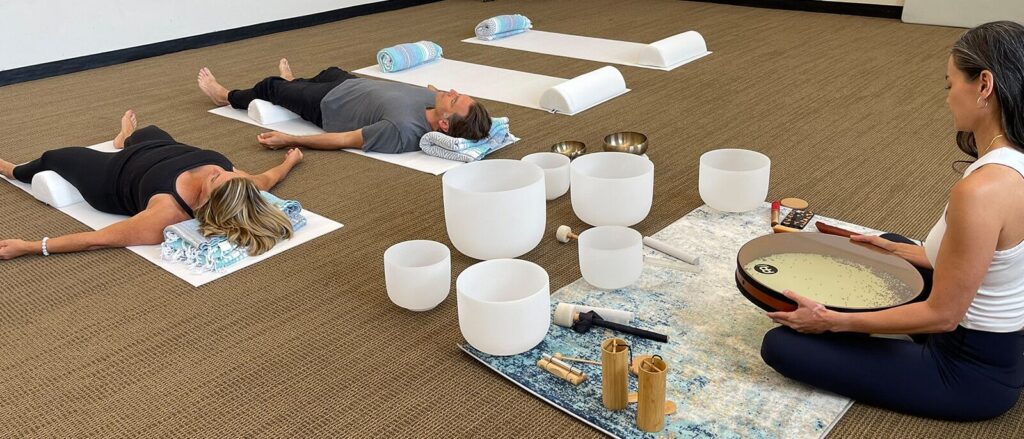The Connection between Relaxing Baths and Meditation Practices

Finding Peace in Water and Mindfulness
In today’s fast-paced society, the incessant notifications and demands for attention can leave individuals feeling overwhelmed and drained. Finding effective ways to unwind has never been more crucial. Among the popular methods to achieve relaxation, relaxing baths and meditation have gained traction as transformative experiences. But what innovative advantages can arise from merging these two practices?
Research has unveiled compelling evidence that immersing oneself in warm water can significantly elevate one’s meditative experience. While they both promote tranquility independently, combining them could foster deeper relaxation and insight. Below are some fascinating connections related to this synergy:
- Stress Reduction: Warm baths have been shown to lower cortisol levels, mirroring the stress-relief benefits of regular meditation. According to a study published in the journal Health Psychology, individuals who engage in such practices report significantly lower anxiety levels.
- Improved Focus: The tranquil atmosphere created by warm water can serve as a sensory sanctuary, aiding individuals in centering their thoughts during meditation. The rhythmic sounds of water and the gentle warmth can minimize distractions, fostering a focused state of mind.
- Enhanced Creativity: Many people experience a surge in creativity following a soothing bath, paralleling the boost in innovative thinking often reported after meditative sessions. This is likely due to the calming effect that allows the mind to wander freely and make new connections.
Incorporating meditation into your bath routine can transform an ordinary soak into a rejuvenating ritual. Imagine closing your eyes as you immerse yourself in fragrant, warm water—perhaps infused with soothing lavender or eucalyptus oils. The steam envelops you while you practice mindful breathing, further enriching the calming atmosphere. This combination allows you to not only relax your muscles but also cultivate a heightened sense of awareness and presence.
Ultimately, exploring the union of these two practices can lead to a more balanced and peaceful life. Whether you opt for a quick 10-minute soak or an hour-long meditation, the integration of relaxing baths and mindfulness can provide you with the restorative experience your mind and body crave. Embrace this harmonious combination and allow yourself to discover the profound tranquility it can bring to your daily routine.
DON’T MISS: Click here for a refreshing mental reset

The Therapeutic Benefits of Water and Mindfulness
As the quest for relaxation intensifies, understanding the individual benefits of relaxing baths and meditation becomes imperative. Each practice offers distinct advantages, but their intersection reveals a multifaceted approach to well-being. To fully grasp the connection, it’s essential to explore the physiological and psychological responses triggered by both activities.
Studies suggest that warm water immersion can enhance blood circulation, which in turn promotes an overall sense of calm. The heat from the water stimulates the release of endorphins, the brain’s natural painkillers, allowing the body to release tension and worries accumulated throughout the day. This physical relaxation creates an ideal backdrop for meditation—allowing practitioners to delve deeper into a state of mindfulness.
Connecting the Dots: The Mind-Body Link
When it comes to meditation, practitioners often report a myriad of benefits including improved emotional regulation, heightened self-awareness, and reduced symptoms of anxiety. These outcomes are not only psychological; they have profound physiological effects as well. The combination of a relaxing bath and meditation offers a unique opportunity for self-exploration and healing. Here are some concrete benefits of integrating these two practices:
- Mindful Breathing: The act of focusing on breathing while in a warm bath can amplify relaxation. Breathing exercises can lower heart rate and contribute to a meditative state.
- Enhanced Sensory Experience: With the senses heightened in a warm bath, the experience of tranquility can be deepened through aromatherapy or calming music, immersing you fully in a moment of stillness.
- Body Awareness: Submerging the body encourages awareness of physical sensations, helping individuals to recognize areas of tension and consciously release them, thus creating a cycle of relaxation and mindfulness.
Combining the serenity of a bath with the mental discipline of meditation can usher in a state of clarity and peace that is often hard to achieve. This integrative approach invites individuals to not only escape from daily stresses but also cultivate a profound connection with their inner selves. As you uncork the potential benefits of this powerful synergy, consider how carving out time for both practices could impact your mental and emotional health.
Ultimately, the combination of relaxing baths and meditation may well enhance your well-being significantly. The ritual of slowing down and connecting with water and breath could lead to meaningful changes in your perspective and quality of life. As we delve into the intricacies of how these practices work together, the invitation to explore their combined effects grows ever more compelling.
The Connection between Relaxing Baths and Meditation Practices
When discussing the symbiotic relationship between relaxing baths and meditation practices, it is essential to explore how each activity enhances the other to foster a deeper sense of well-being. Baths offer an immersive sensory experience that can significantly improve one’s meditative state. The warmth of the water relaxes muscles, eases tension, and allows for a heightened awareness of the present moment, essential when entering a meditative mindset.
An ideal setting for meditation is often one of tranquility and comfort, which is undoubtedly enhanced by a calming bath. Integrating essential oils or bath salts can further deepen relaxation by engaging the olfactory senses, creating a multi-sensory experience that enriches meditation.
Additionally, taking a bath provides a unique opportunity for solitary reflection. This act of personal indulgence transforms a simple bath into a sanctuary where one can practice mindfulness—allowing thoughts to drift away while focusing on the soothing sensations of water enveloping the body.
| Benefits of Baths | Associated Meditation Benefits |
|---|---|
| Promotes relaxation and stress relief | Enhances focus and concentration in meditative practices |
| Regulates body temperature and improves circulation | Boosts emotional clarity and self-awareness during meditation |
Incorporating a relaxing bath into a meditation routine not only serves as an exquisite form of self-care but also creates a harmonizing routine that potentializes both practices. By merging these two calming experiences, individuals may discover an enriched pathway towards mental clarity and emotional balance.
DISCOVER MORE: Click here to find out how to relax
Diving Deeper: The Synergy of Bathing and Mindfulness
As research continues to unveil the health benefits of both relaxing baths and meditation practices, understanding their synergistic effects becomes increasingly significant. The immersive experience of a warm bath combined with the intentional focus of meditation offers not only moments of respite but also pathways to deeper emotional and psychological healing.
Enhancing Meditation with Hydrotherapy
Hydrotherapy, or water therapy, dates back to ancient civilizations, highlighting the longstanding appreciation for water as a healing element. When one meditates in a warm bath, the calming properties of water can significantly enhance *mindfulness*. The practice of mindfulness itself—being present in the moment without judgment—is easier to achieve in a soothing environment. This can lead to more profound meditative experiences, allowing one to settle into the practice without the distractions of the external world.
The gentle waves created by your movements in the bathtub can mimic the sensation of being in a natural water body, promoting an even deeper connection to the self. For many, this element of nature is vital, as studies indicate that elements such as *nature sounds* or water-inspired visuals can trigger relaxation responses. Integrating these sensory experiences while meditating in a bath can amplify the effectiveness of both practices.
The Impact of Temperature on Mental States
Research suggests that the temperature of water plays a crucial role in how relaxing baths enhance meditation. Warm water can stimulate the production of oxytocin, often referred to as the “love hormone”. This hormone is linked to lower stress levels and greater emotional connection, creating a more fertile ground for introspection during meditation. Conversely, cooler water has been shown to sharpen focus and invigorate the mind, indicating that temperature can influence the *mood* and intention behind your meditative practice.
Creating a Ritual for Optimal Results
To fully tap into the therapeutic benefits of combining relaxing baths with meditation, establishing a routine can further enhance effectiveness. Here are several ways to create an impactful ritual:
- Set the Scene: Dim the lights and introduce calming scents using essential oils such as lavender or eucalyptus to promote relaxation.
- Incorporate Gentle Movement: Before settling into meditation, engage in gentle stretches or floating to release any physical tension and prepare the body.
- Customize Meditative Practices: Experiment with guided meditations specifically designed for relaxation, or try techniques such as body scanning, which can be particularly impactful while ensconced in warm water.
The relationship between relaxing baths and meditation isn’t merely about seeking refuge from stress, but an avenue for fostering deeper emotional connections and state-of-mind management. As practitioners explore the **therapeutic benefits** of these overlapping modalities, they may find new ways to nurture their mental landscapes and create a sanctuary within their daily lives. Through these practices, the potential for personal transformation is profound, laying a foundation for improved overall well-being.
DISCOVER MORE: Click here to learn about water meditation
Conclusion: Embracing the Harmony of Water and Mindfulness
In exploring the intricate connection between relaxing baths and meditation practices, we unveil a holistic approach to well-being that transcends conventional stress relief methods. The fusion of the thermodynamic benefits of warm water and the introspective power of meditation offers a unique sanctuary for emotional healing and personal discovery. As individuals immerse themselves in this dual practice, they not only enhance their ability to engage in mindfulness but also cultivate deeper connections within themselves.
Research highlights the profound implications of water’s therapeutic qualities—stimulating the release of hormones that forge emotional bonds and alleviate stress while simultaneously creating an environment conducive to mindfulness. Establishing a ritualistic approach to integrating relaxing baths with meditation can further amplify these benefits, encouraging practitioners to customize their experiences to suit their needs.
As we continue to embrace the mental health landscape of the modern age, recognizing the significance of therapeutic practices like these becomes imperative. Individuals seeking balance in a fast-paced world may find that the simple act of bathing, when paired with mindful contemplation, unveils pathways toward enhanced emotional and psychological health. It is an invitation to not just escape, but to explore—a reminder that self-care can flourish in the harmony of water and awareness. So, take a moment, draw a bath, and allow the synergy between relaxation and meditation to guide you on a journey towards a more harmonious existence.
Related posts:
Quick Meditation Tips to Enjoy While Showering
Transform Your Shower Quick Meditations for Instant Relaxation
Shower Meditation: Tips to Enrich Your Daily Moment
Shower Ritual: Incorporating Meditation into Your Daily Routine
Shower Meditation: A Simple Method to Relieve Stress
Quick Meditations: Finding Inner Peace in Moments of Personal Hygiene

Beatriz Johnson is a seasoned meditation teacher and writer with a passion for demystifying mindfulness and inner peace. With over a decade of experience in contemplative practices, she specializes in topics like stress reduction, mindful living, and cultivating mental clarity. Through her work on our website, Beatriz empowers readers to develop self-awareness, make conscious choices, and maintain emotional balance in life’s constant flux.